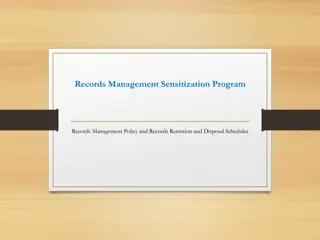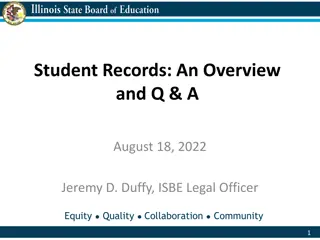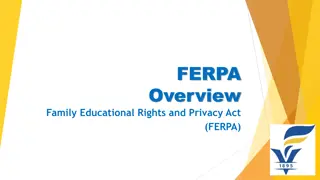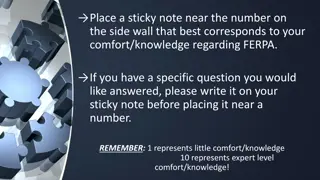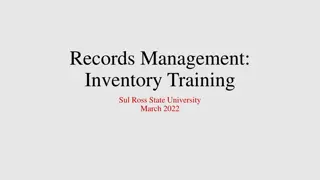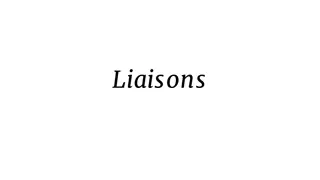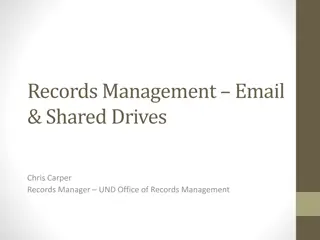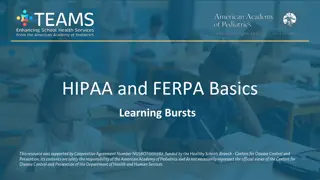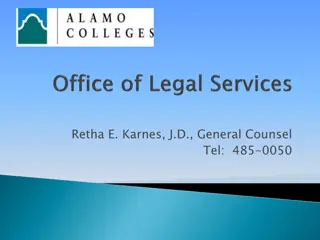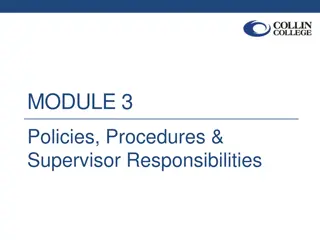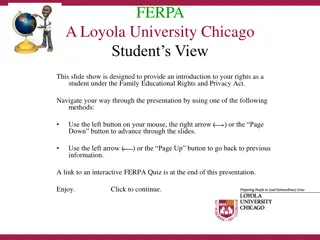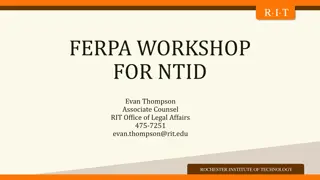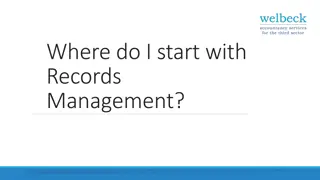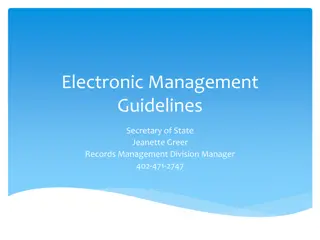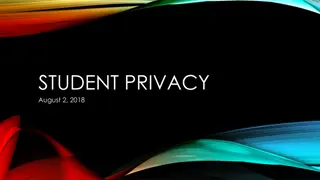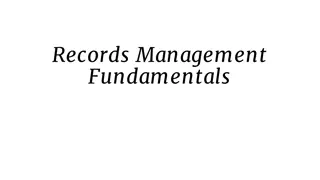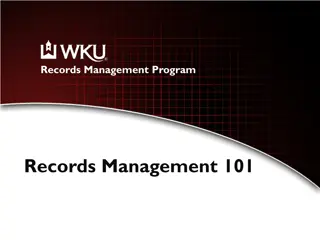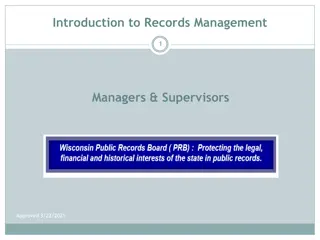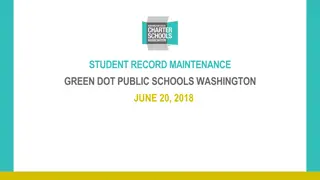Understanding FERPA and Educational Records in the Digital Age
FERPA, the Family Educational Rights and Privacy Act, ensures the privacy of education records for eligible students. This act grants students rights to review, request amendments, consent to disclosures, and file complaints. Faculty and staff must adhere to strict rules regarding access to and protection of education records. Education records encompass various student-related information and must be handled with care to comply with FERPA regulations.
Download Presentation

Please find below an Image/Link to download the presentation.
The content on the website is provided AS IS for your information and personal use only. It may not be sold, licensed, or shared on other websites without obtaining consent from the author. Download presentation by click this link. If you encounter any issues during the download, it is possible that the publisher has removed the file from their server.
E N D
Presentation Transcript
FERPA and Educational Records: What Every Employee Should Know In the Digital Age Eugene Whitlock, Vice Chancellor HR and General Counsel January 2018 Important note: This presentation is intended to give viewers general information about FERPA and to acquaint faculty and staff with some of the privacy issues surrounding students' educational records. It is not intended as nor is it a substitute for legal advice on any particular issue.
What is FERPA? The Family Educational Rights and Privacy Act of 1974, also known as FERPA, is a federal law designed to protect the privacy of education records and guarantees eligible students the following four rights: 1. The right to inspect and review educational records 2. The right to seek to amend education records 3. The right to consent to disclosures of personally identifiable information contained in the student s education records, except to the extent that FERPA authorizes disclosure without consent 4. The right to file a complaint with the Department of Education against any institution for an alleged violation of their FERPA rights. The office that administers FERPA and investigates violations is the Family Policy Compliance Office, located in Washington, D.C. FERPA applies to the District because the colleges receive federal funds. 2
Who is protected by FERPA? All Eligible Students An eligible student is a student who is currently attending the college or who has previously attended the college. This includes students attending any educational program, whether credit, non-credit degree or non-degree. FERPA rights continue after the student leaves the institution and are only terminated upon written request or death. FERPA does not apply to applicants who have been denied admission or who were admitted but who have not actually been in attendance. 3
What are the basic rules? As a faculty or staff member you have access to Education Records only for legitimate use in the completion of your responsibilities as a university employee. Need-to-know is the basic principle. Education Records are confidential and may generally not be released without written consent of the student. You have a responsibility to protect education records in your possession. 4
What is an Education Record? Education Record An Education Record is any information that is directly related to a student and maintained in a central location by an institution (or party acting for the institution). Education Records may be in any form and include written documents, computer media, video or audio tape, photographs, and electronic files. Examples include: Demographic Information Enrollment Records Grades Social Security Number Class Schedules Class Lists Graded Papers ID Number 5
What is not an Education Record? Education Records do not include: Sole Possession Records - a record, such as notes, kept by a faculty or staff member if it is kept in the sole possession of the maker of the record and is not accessible or revealed to any other Campus Law Enforcement Records - records maintained solely for the law enforcement purposes & revealed only to law enforcement agencies Employment Records (excluding student employment records such as work study or student assistant records) Medical Records - records created by a health care professional used only for the medical/health treatment of the student Alumni Records - records created after student has left the institution 6
Is an email an education record? PROBABLY NOT. Generally speaking, an emails, texts, Tweets, and other digital communications are not education records unless they are printed out and maintained in the same way as other education records, i.e. in a student file. Emails, like assignments passed through the hands of students, have a fleeting nature. An email may be sent, received, read, and deleted within moments. As such, Student s assertion that all emails that identify Student, whether in individual inboxes or the retrievable electronic database, are maintained in the same way the registrar maintains a student s folder in a permanent file is fanciful. Like individual assignments that are handled by many student graders, emails may appear in the inboxes of many individuals at the educational institution. FERPA does not contemplate that education records are maintained in numerous places. As the [Supreme Court in Owasso] set forth . . . Congress contemplated that education records would be kept in one place with a single record of access. S.A. v . Tulare County Office of Ed (2009). 7
True or False Two professors exchange e-mails about the performance of a common student. The student is entitled to see this email exchange because it is an education record. FALSE. Such a document would not be considered an education record because it is not maintained by the college. 8
Key Terms School Official School Officials are people employed by the college in administrative, supervisory, academic, research or support staff positions, including university police and health services staff. School Officials also include people or companies such as attorneys, auditors, collection agencies, or the entities with whom the college has contracted or to whom the college must report. Legitimate Educational Interest Legitimate Educational Interest is the need to review a student s educational record by a university official in order to fulfill his or her professional responsibilities. 9
Key Terms (Pt 2) Personally Identifiable Information Personally Identifiable Information is a list of personal characteristics or other information which would make a student s identity easily traceable or discoverable. Directory Information Directory Information is information which institutions may usually release without student permission. Directory Information includes: student s name and dates of attendance Participation in officially recognized activities and sports, including weight, height and high school graduation of athletic team members 10
Key Terms (Pt 3) Examples of Directory Information (cont d): Degrees and awards received including honors, scholarship awards, athletic awards and Dean s List recognition NOTE: A student can restrict the release of any or all directory information by requesting that it be kept confidential. 11
FERPA Compliance There are a few requirements to maintain compliance with FERPA: Provide students with annual notification of their rights under FERPA. 1. Provide students with access to their Education Records. 2. Students have the right to inspect and review their Education Records within 45 days of their request. However, before releasing a student s record the custodian must remove the following: Parent s financial information Confidential letters and letters of recommendation Educational Records with information about more than one student 12
FERPA Compliance (Pt 2) 3. Obtain prior written consent before disclosing non-directory personally identifiable information from a student s educational record (except under those circumstances allowed by FERPA). Exceptions to the prior written consent requirement: To accrediting organizations; To the parents of a student, who is considered a dependent student under the Internal Revenue Code; If the information is Directory Information and the student has not requested that Directory Information be withheld; For School Officials who have a legitimate educational interest in viewing a student s educational record; For officials at an institution at which a student seeks to enroll; In connection with health or safety emergencies if necessary to protect the student or others; 13
FERPA Compliance (Pt 3) Exceptions to the prior written consent requirement (continued): For parents of a student younger than 21 years of age if the disclosure concerns discipline for violation of the campus drug and alcohol policy; For financial aid lenders checking enrollment status for loan purposes; In response to a court order or subpoena, after reasonable effort has been made to notify the student (unless ordered by the court not to contact the student); For authorized representatives of the: Secretary of the Dept. of Education Office of the Comptroller General U.S. Attorney General s Office State and local education authorities as part of an audit or program review Research firms working for the college Military Recruiters 14
FERPA Compliance (Pt 4) 4. Maintain a record of requests and disclosures of Educational Records. The college is required to maintain records of requests and disclosures on personally identifiable information that is non-Directory Information. The record must include the names and addresses of the requestor and his/her indicated interest in the student s Educational Records. 15
What about social media? When using Twitter, Facebook, or other social media platforms, never reveal information about students that might indicate their grades, course enrollments, class schedules, and so on. Doing so could be noted as a FERPA violation if called out by the student. When students are assigned to post information to public social media platforms, they should be informed that their material may be viewed by others. Students should not be required to release personal information on a public site. RELATED TIP: Keep your private life private. Create a separate social media account for professional purposes. 16
True or False? A student creates and posts a blog to fulfill a class assignment. This blog is an education record. FALSE. Because the college does not maintain the blog, it is not considered an education record. However, by having students post blogs, the instructor risks inadvertently asking students to reveal their class schedules and other data that is protected under FERPA. It is thus always important to ensure that your students know what you are asking of them. A simple solution in this case is for the instructor to give students a lesson on how to make their blogs private. 17
True or False? The Professor comments on the blog and mentions the student s grade. This does not violate FERPA because the blog is not maintained by the college. FALSE. Even though the college does not maintain the blog, and it is not considered an education record, the Professor still cannot publicly disclose a student s grade. 18
True or False A Professor and Student exchange text messages about a student s grade. This makes the text messages education records. FALSE. The text messages are not maintained by the college and therefore they are not education records. However, be careful using text messages because you never really know who is sending or receiving them. 19
True or False A Professor directs her students to check in on Facebook when they are in class letting people know where they are. This is a violation of FERPA. TRUE, mostly. Just as the school cannot reveal what classes a student has, or where the student is on campus, requiring a student to divulge the location via Facebook, Tweet, etc. is equally problematic. 20
FERPA and Parents When a student reaches the age of 18 or begins attending a postsecondary institution regardless of age, FERPA rights transfer from the parent to the student. Therefore, parents may obtain their child s Education Records only under the following circumstances: The parent provides documentation certifying that the student is a legal dependent; OR The student signs a consent form. 21
True or False? If a student s parent calls asking how a student is doing in a class, you can give out that information. FALSE. Even though the person inquiring may be the student s parent, FERPA recognizes students in higher education as adults, regardless of age. Therefore, you cannot give out that grade, or any other non-directory information unless the student has granted access to his parents or unless the parents has demonstrated that the student is a dependent. Because you do not know the identity of the caller or whether the student has a restriction, you should not release information to any third party.
True or False? You get a frantic phone call from an individual who says that he is a student s father and must get in touch with her immediately because of a family emergency. You can tell him when and where her next class is today. FALSE. For the safety of the student you (faculty member) should not tell another person, especially one whom you cannot identify, where a student is at any time. Inform the caller they should contact Admissions and Records.
Practical Tips: Dos DO: Use randomly assigned numbers or codes to display scores or grades. Keep any personal notes relating to individual students separate from Education Records. Keep only those individual student records necessary for fulfillment of your responsibilities. Prior to releasing Directory Information on a student, ensure that they do not have a FERPA hold on their information. Ensure that student information is shredded when no longer needed. Turn off your computer and cover or put away papers that contain confidential information if you are going to step away from your desk. 24
Practical Tips: Do Nots DONOT: Display student scores, grades, Social Security Numbers, or ID numbers publicly. Circulate a class list with the student name linked to their SSN or ID number. Put papers, projects, graded exams, or reports in publicly accessible places. Share student information, including grades or GPA s, with other faculty or staff unless their responsibilities warrant a need-to-know. Discuss a student s progress with anyone (including parents) without the written consent of the student. Discuss confidential student information in a manner in which others who do not have a legitimate interest in knowing such information can hear. Provide anyone with lists of students enrolled in your classes for any commercial purpose. 25
True or False? You receive a call from a recruiting firm asking for names and addresses of students with a GPA of 3.0 or better. They say they have good job information for these students. You can help these students get jobs by giving out this information. FALSE.While we all want to help students to get good jobs, the request should be sent to the appropriate office. Do not give out student information that pertains to grade point average to anyone without prior written consent of that student. All outside requests for information must be referred to Admissions and Records. Information about the recruiting firm, however, could be provided to students.
True or False You receive a non-emergency phone call from the local police department indicating that they are trying to determine whether a particular student was in attendance on a specific day. Since they are in the middle of a investigation, you are allowed to give them this information. FALSE. Information about whether or not a student was enrolled in a particular semester is directory information and can be obtained through the Registrar s Office. If the police require more information, a subpoena may be required. Additionally, FERPA requires notification be sent to the student, unless it is specifically stated on the subpoena that the student must not be notified.
True or False A student asks you for grade information because there is a hold on his or her record. You are allowed to give the grade to the student. TRUE. By law, students may view records but institutions may withhold official copies of documents when money is owed to the institution. Therefore, if a student has a hold they most likely have an outstanding balance with the College and are being prompted to make arrangements for payment by being directed to a business associate to resolve the matter. Holds may also be applied for reasons other than finances, and are effective only when the student goes through appropriate channels to get access to the record. (FERPA allows us to withhold access for up to 45 days.)
True or False An unauthorized person retrieves information from a computer screen that was left unattended. Under FERPA, the staff member or institution is responsible. TRUE. Information on a computer screen should be treated the same as printed reports. The medium in which the information is held is unimportant. No information should be left accessible or unattended, including computer displays.
True or False You have been granted access to certain educational records in accordance with your duties. Since this is information you are entitled to under FERPA, you can share this with a colleague. FALSE. FERPA states that you may not redisclose information without prior consent. There are some occasions when this is allowable, such as release to organizations conducting educational studies, accrediting agencies, and judicial orders. Check with the Registrar and Academic Systems office before releasing information. If the colleague needs to know , i.e. has a legitimate educational interest in receiving the information, then you can redisclose the information.
True or False You are facing an emergency situation where you fear the health and safety of people is in jeopardy if you do not release certain protected information to a third party. You can exercise judgment and release the information. TRUE. The health and safety of members of the college community is paramount and FERPA is not intended to increase the risk of an individuals safety in an emergency situation. There is a provision in FERPA which states that you may release information from an education record to an appropriate person in connection with an emergency if knowledge of the information is necessary to protect the health or safety of the student or other individuals.
Letters of Recommendation Letters which include the student s GPA, grades, or any other non- directory information, require the written consent of the student. Determine whether the student waives the right to review a copy of the recommendation. The Office of Admissions and Records can provide you with the appropriate form to use when writing a letter of recommendation which requires student consent. Letters which contain statements based on the writer s personal observation or knowledge, do not require a written release from the student. 32
Final Thought When in doubt, err on the side of caution and do not release Education Records. Contact the Office of Admissions and Records for guidance. 33

 undefined
undefined



